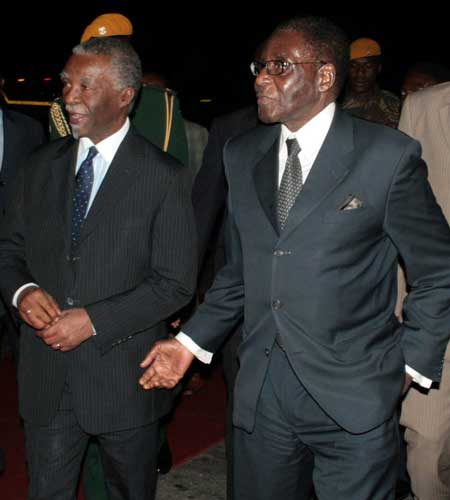Compromise 'close' in Zimbabwe crisis talks

Your support helps us to tell the story
From reproductive rights to climate change to Big Tech, The Independent is on the ground when the story is developing. Whether it's investigating the financials of Elon Musk's pro-Trump PAC or producing our latest documentary, 'The A Word', which shines a light on the American women fighting for reproductive rights, we know how important it is to parse out the facts from the messaging.
At such a critical moment in US history, we need reporters on the ground. Your donation allows us to keep sending journalists to speak to both sides of the story.
The Independent is trusted by Americans across the entire political spectrum. And unlike many other quality news outlets, we choose not to lock Americans out of our reporting and analysis with paywalls. We believe quality journalism should be available to everyone, paid for by those who can afford it.
Your support makes all the difference.President Robert Mugabe was locked in marathon talks with Zimbabwe's opposition leaders last night as speculation mounted that they were on the brink of a deal to end the at-times violent political crisis.
After almost 12 hours of discussions in a Harare hotel, with South African President Thabo Mbeki watching over them, the leaders had still not emerged to announce the long-hoped for pact
Both Mr Mugabe and opposition leader Morgan Tsvangirai are under immense pressure to sign a power-sharing arrangement, given the economic freefall that Zimbabwe is in. The deal would see Zimbabwe keep the only president it has ever known, with the opposition leader coming in as prime minister.
Sources close to the talks suggested the delay stemmed largely from an argument about who would appoint Mr Tsvangirai to the prime ministerial post.
The opposition won the parliamentary elections in March, while Mr Mugabe was re-elected in a widely condemned run-off presidential vote in June for which he was the sole candidate. Mr Tsvangirai is said to want parliament to appoint him so that he is not at the mercy of Mr Mugabe's whims.
Other sticking points included who had control over key ministries, particularly the security-related portfolios that the Zimbabwe president has previously used to maintain an iron grip on power, and whether the new government would serve for a two-year transitional period, as sought by the opposition, or a full five-year term as sought by Mr Mugabe's Zanu-PF.
Negotiators from the government and the two wings of the Movement for Democratic Change party have been holding talks for the past three weeks. Western powers, such as Britain and the US, are standing by to plough money into rebuilding Zimbabwe, but only, they say, if the MDC and Mr Tsvangirai are given the senior role in the new regime.
A clear sign the two sides were overcoming their differences emerged on Thursday when they issued a statement condemning widespread violence. The MDC subsequently issued another statement promising not to reverse Mr Mugabe's controversial white land seizures.
The MDC breakaway faction leader Arthur Mutambara wrote an a newspaper over the weekend that a compromise was close. Despite limitations, it offered the "best temporary measure to extricate the country from its worst situation".
The three leaders were brought under one roof for the first time yesterday.
A deal would also boost Mr Mbeki, the beleaguered mediator, who is anxious to clinch a deal before a summit of the Southern African Development Community next weekend.
Join our commenting forum
Join thought-provoking conversations, follow other Independent readers and see their replies
Comments